The graying couple raised their right hands in the children’s courthouse, as the judge swore them in.
Teodulo Diarte held tight to his granddaughter Harmony as his wife, Olga Perez, kept her one good eye on their 2-year-old, Faith, who rocked back and forth. The couple, in their 60s, were preparing to adopt their two youngest granddaughters.
The pre-Thanksgiving ceremony wasn’t the first time they had appeared in this courthouse on a similar crucial mission. They had already adopted their three older granddaughters here.
Diarte and Perez’s daughter, Maria, had struggled for years with drug addiction. Four of her five daughters tested positive for drugs when they were born. Faith didn’t eat for five days as she went through withdrawals at birth.
Teodulo Diarte, who adopted his granddaughters, looks at an adoption certificate he received after a ceremony in Monterey Park.
(Irfan Khan / Los Angeles Times)
And so, like more than 2 million grandparents across the country who are raising their grandchildren, Diarte and Perez have forgone retirement to become parents once more. With the girls’ various health issues, it is a 24-hour job.
The money the couple receive from the government each month to care for the girls goes toward groceries. Toward rent. Toward new shoes and clothes. They bought a minivan to take the girls to and from school and on trips.
They are the rare grandparents — and the rare adoptive parents — to take in not one, not two, but five siblings, doing something of utmost importance the foster care system can’t always achieve: keeping a sprawling family together.
In the Monterey Park courtroom, they sat at a table covered in teddy bears for the 136 children being adopted that fall day — 89% of them by relatives such as Diarte and Perez.
“Yay, you did it!” Faith cheered, her mouth widening to reveal the gap between her front teeth.
“Qué bonita family,” Diarte said with a smile, as he looked around at his girls. “What a beautiful family.”
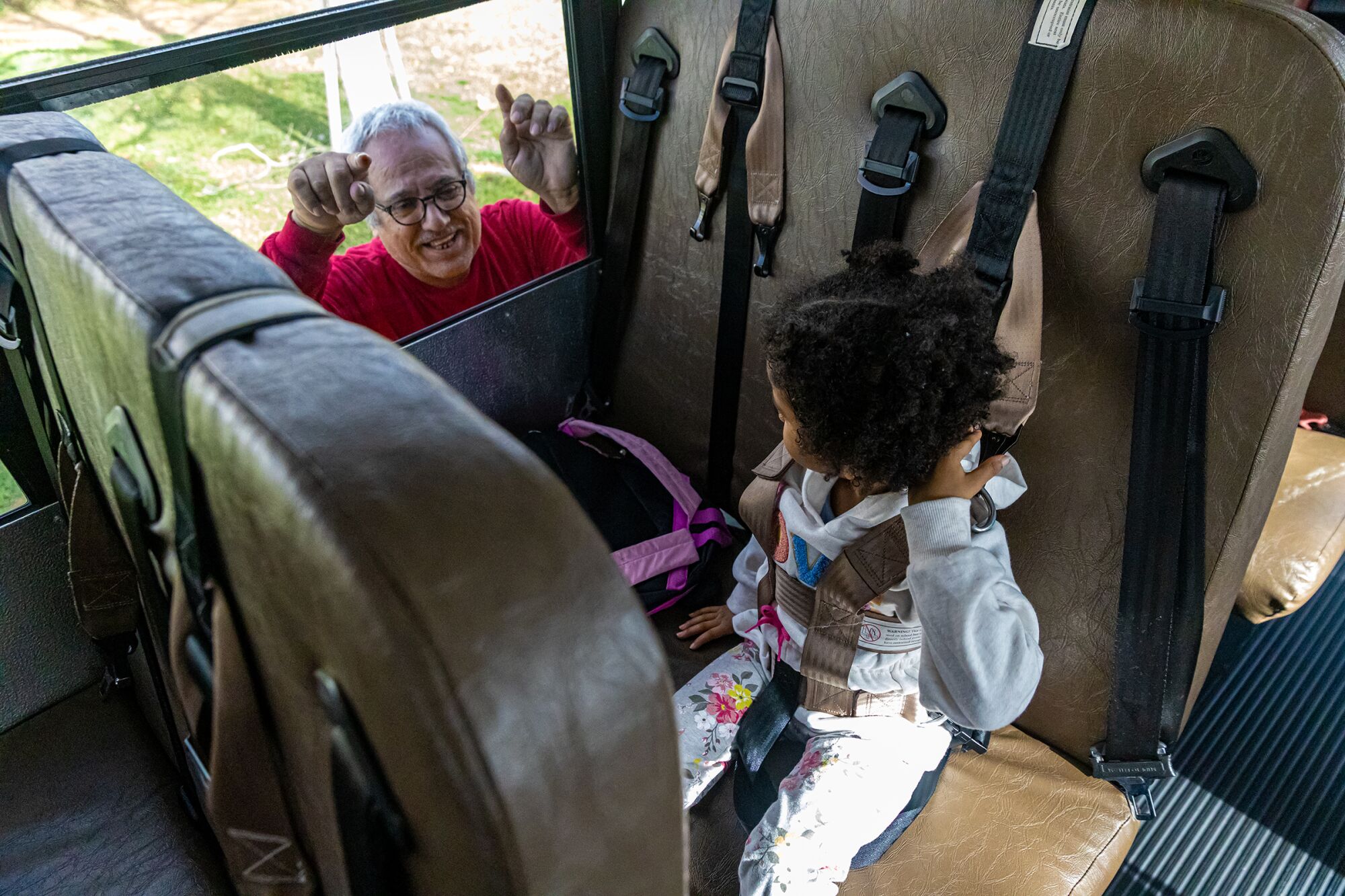
Teodulo Diarte says goodbye to 4-year-old Harmony Diarte on her way to school.
(Irfan Khan / Los Angeles Times)
As of April, 7,445 children and youth, unable to safely remain at home, were in foster care and living with relatives or close family friends, according to the Los Angeles County Department of Children and Family Services.
Donna Butts, executive director of Generations United, a Washington-based advocacy group, said relative caregivers are more likely to keep siblings together, as in the case of the Diarte family.
“It would be hard to find a foster parent that would take on five children,” she said. “They would split the children up, and that is another trauma, another sense of loss for the children.”
::
Perez, 62, and Diarte, 66, had already raised three children in L.A. County when their 19-year-old daughter, Maria, became pregnant with their first grandchild. As Maria raised Melody in the Cudahy house she shared with her parents, Perez grew worried about her daughter’s mistreatment of the little girl.
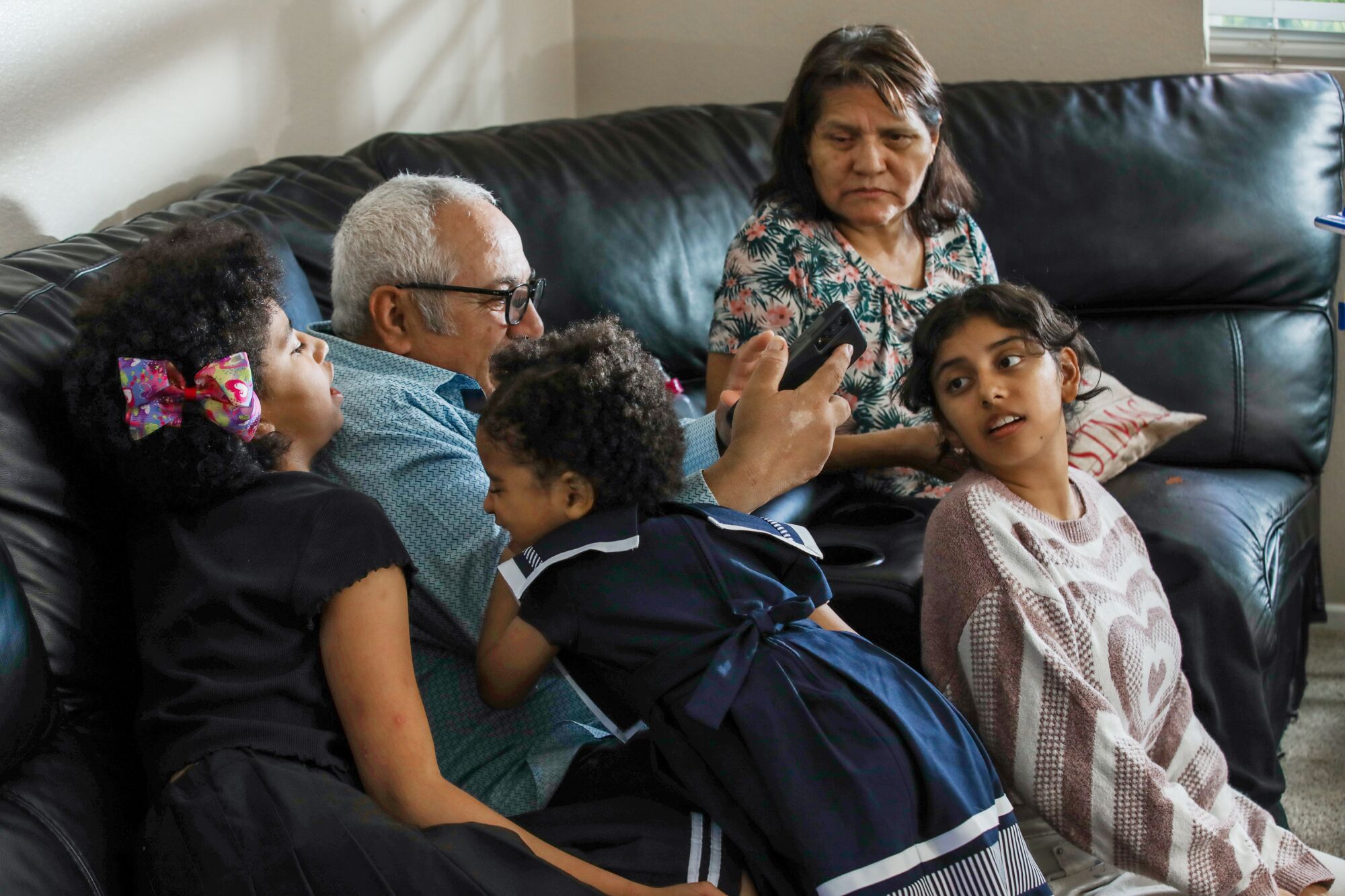
Teodulo Diarte and Olga Perez with their adopted granddaughters Esther, 9, left, Harmony, 4, and Melody, 17.
(Irfan Khan / Los Angeles Times)
In 2010, when Melody was about 5 years old, Perez said she reported her daughter for child abuse. Nothing happened, Perez said, and Maria moved out.
Not long after, Perez said, she learned Maria was leaving the little girl alone overnight. Perez begged Maria to move back in.
“What we wanted to do was save Melody,” Perez said. “She was our priority.”
More problems came in February 2014, several months after Maria gave birth to a second daughter, Esther. Melody, who was 8 years old, recalled her mom and Esther’s dad getting into a physical fight. Melody tried to protect her younger sister.
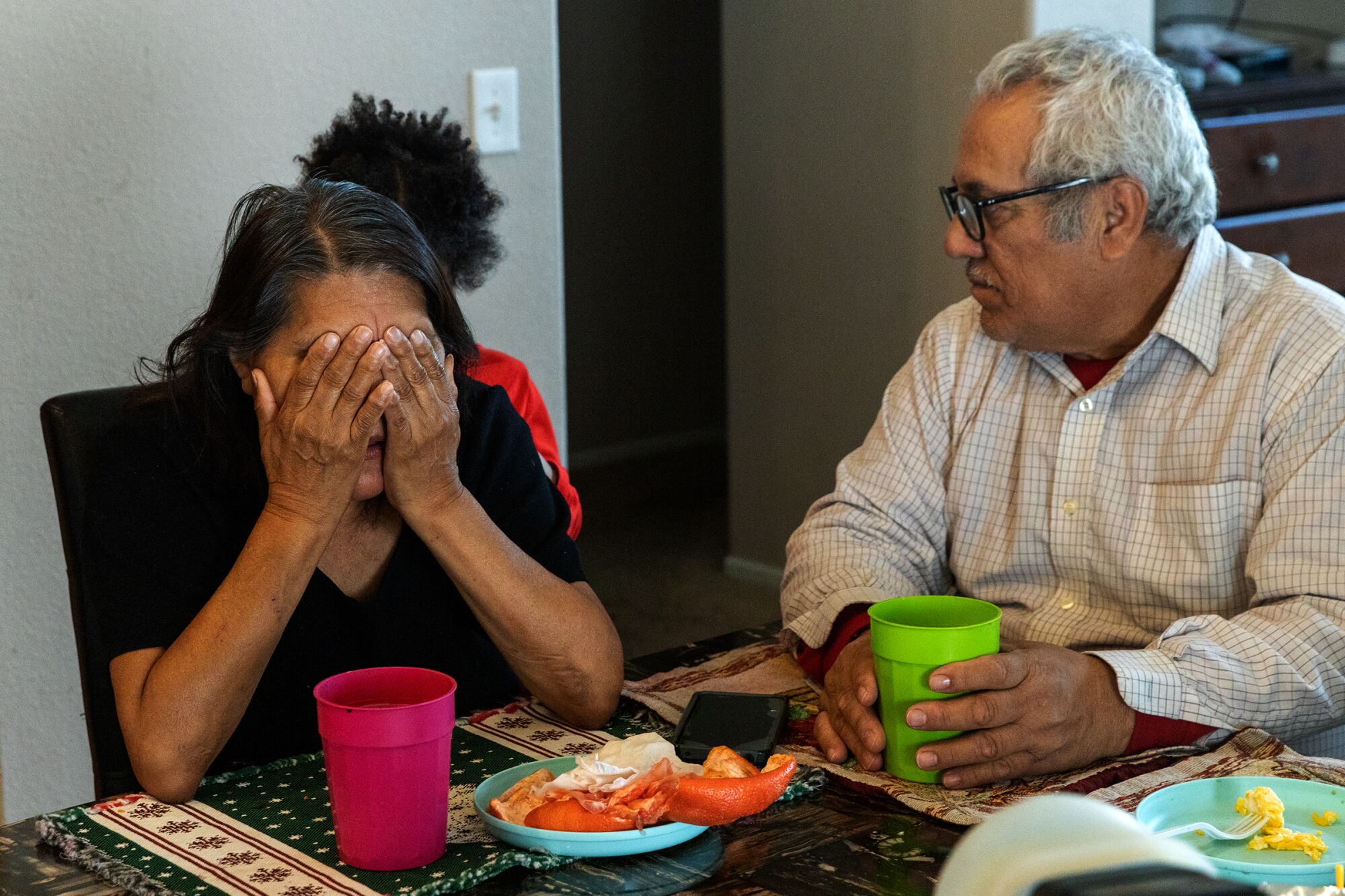
Olga Perez, left, and Teodulo Diarte in a somber mood after receiving a call from their daughter, who they hadn’t seen in half a year.
(Irfan Khan / Los Angeles Times)
“I just remember grabbing my sister and running into the corner and just hugging her, because I wasn’t sure what to do,” Melody said.
Neighbors recorded the couple fighting and reported them to the Department of Children and Family Services, Perez said. When a social worker interviewed Melody and asked her to draw what she’d seen in the home, the little girl drew a marijuana pipe.
Melody and Esther were taken away and returned to their grandparents’ care four days later.
In February 2015, six months after Maria’s third daughter was born, county social workers wanted to return the two older girls to their mother. The goal of DCFS, after all, is for children to safely remain at home with their parents. But, according to Perez, Maria hadn’t stopped doing drugs. Perez took a video of Maria’s drugs in the house and reported her again. Maria’s parental rights were terminated that year.
Through her parents, Maria declined to be interviewed.
The Department of Children and Family Services declined to comment on the Diarte family’s case, citing confidentiality.
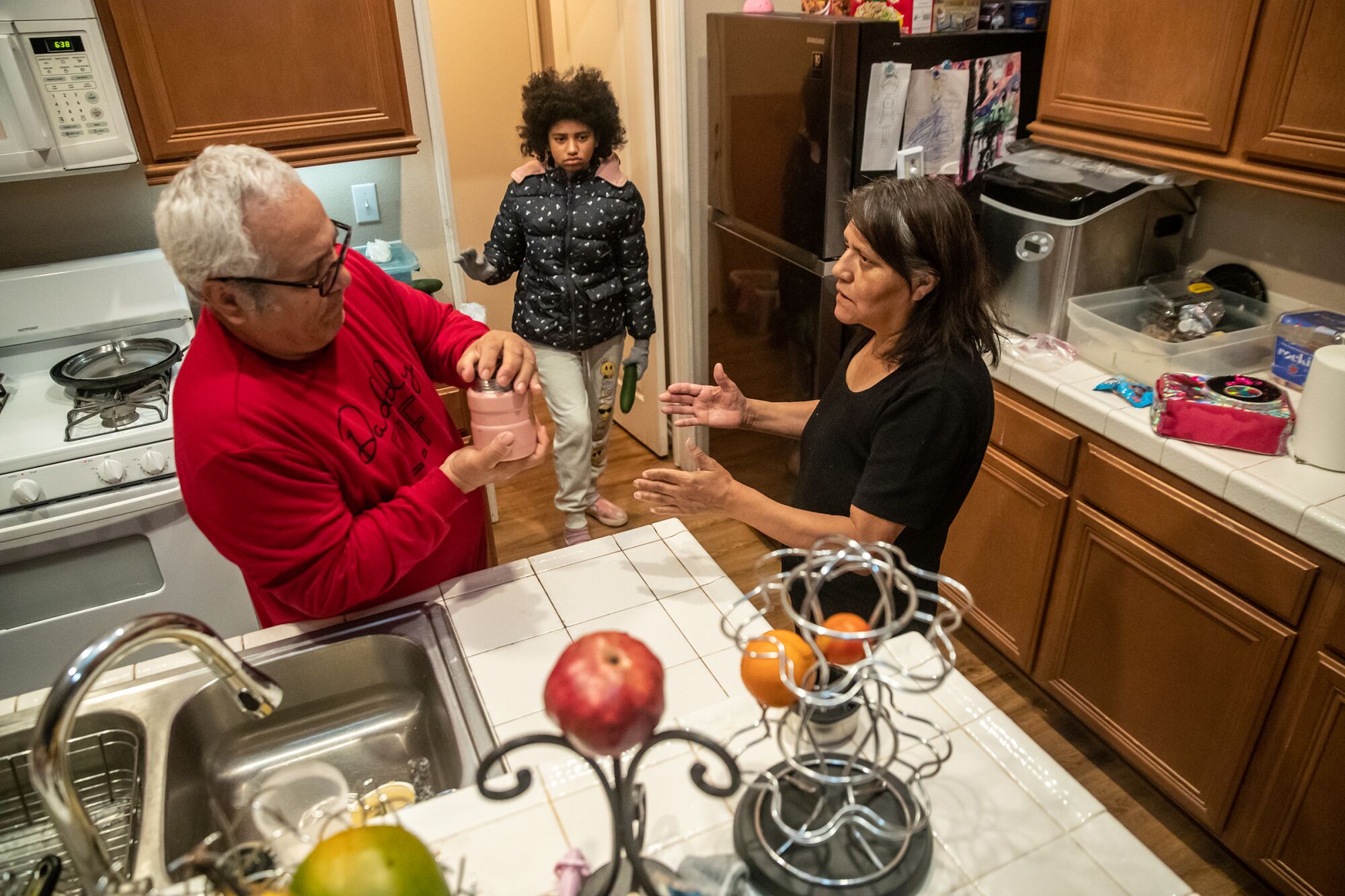
Teodulo Diarte and Olga Perez prepare lunch for Esther, 9, to take to school.
(Irfan Khan / Los Angeles Times)
“We really try not to remove children from their parents, but if it’s not safe we work with the court and others to then make the determination that the child can’t safely be at home,” said Sari Grant, adoptions manager with the department. “Then we do everything we can to try to place them with relatives, because we do know how important that is in terms of reducing trauma and increasing stability.”
In 2018, Maria was pregnant again. Her parents were already struggling to care for her other three children. Perez, dealing with vision issues due to diabetes, had lost sight in one eye after a laser treatment. Diarte left his job in September to help out more.
When Maria’s fourth daughter was born that November, she called her mom crying. There was a social worker at the hospital.
“They’re going to take her away,” she said. “Please, Mom, come for my baby. Take her.”
Harmony came to her grandparents when she was 3 days old.
The growing family could no longer squeeze into their two-bedroom apartment. They moved out of L.A. and started renting a house in Riverside County. Maria stayed behind.
“It would be hard to find a foster parent that would take on five children. They would split the children up and that is another trauma, another sense of loss for the children.”
— Donna Butts, executive director of Generations United

Teodulo Diarte watches as Luz Perez, a DCFS social worker, hugs Olga Perez, after an adoption ceremony in Monterey Park.
(Irfan Khan / Los Angeles Times)
On June 3, 2019, Perez and Diarte adopted their three oldest granddaughters, Melody, Esther and Naomi, in a process that had stretched out for years.
Maria was living on the street and pregnant once more.
When the baby was born, she was malnourished. She wouldn’t eat for five days. She almost died. In March 2020, as the pandemic shut down the world, Diarte and Perez weighed whether to take in granddaughter No. 5.
“If they give her to a stranger, I know we’re not going to see her again,” Diarte told his wife. “God will help us.”
They named the baby Faith.
::
The stars were still winking in the sky when the grandparents began their day.
Diarte rubbed sleep from behind his glasses as he brewed coffee. Perez, who was having vision issues in her good eye, felt her way toward the kitchen.
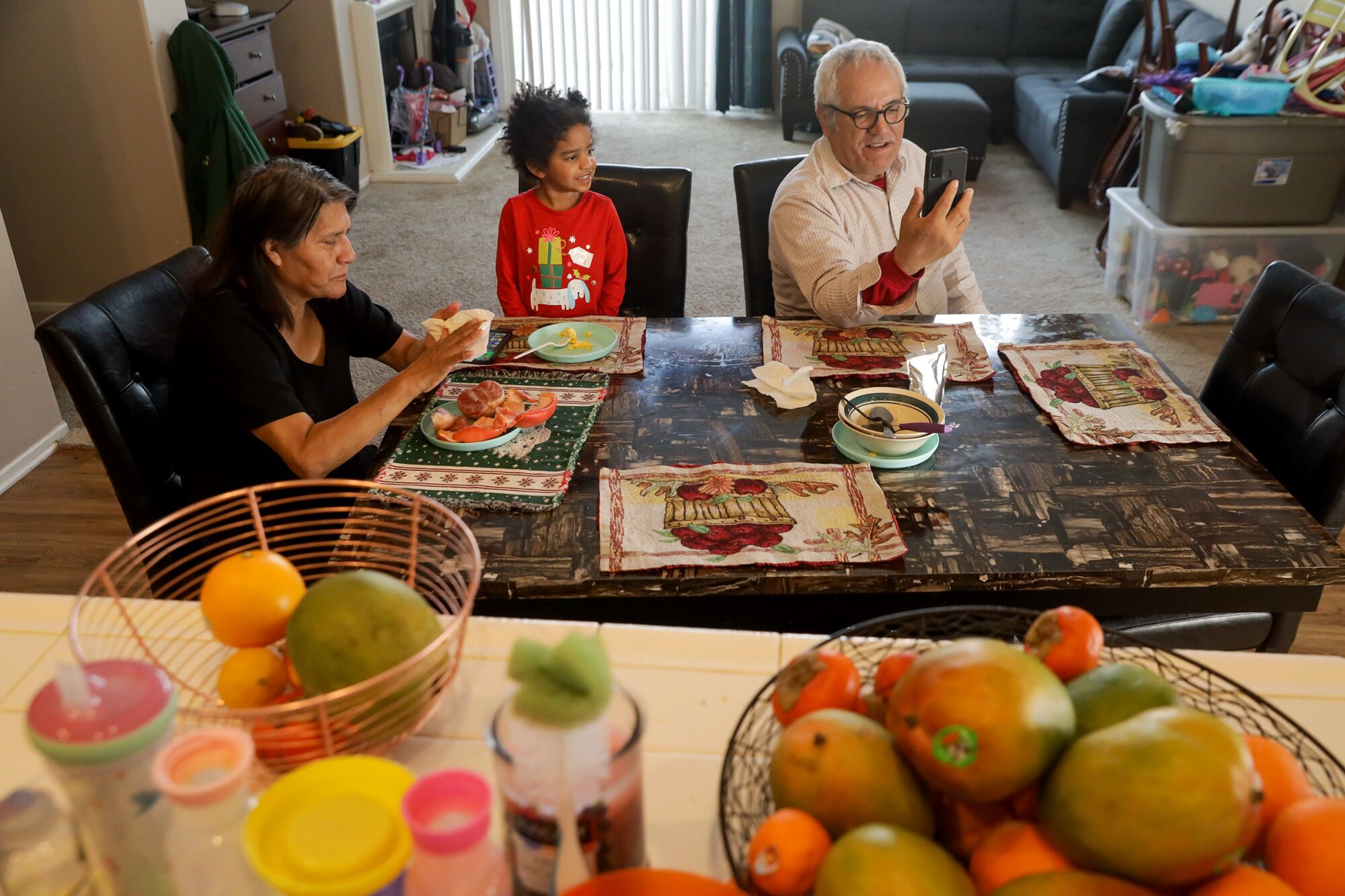
Olga Perez and Teodulo Diarte with 4-year-old Harmony at the breakfast table.
(Irfan Khan / Los Angeles Times)
By 6 a.m., Harmony, 4, and Esther, 9, were awake and clinging to their grandfather — their “tata” — as he started packing school lunches. These two girls were the early risers, but they hadn’t yet changed out of pajamas — one set decorated with Anna and Elsa from the movie “Frozen,” the other with unicorns and donuts.
Diarte, who wore a long-sleeved red shirt that read “Daddy Elf,” heated alphabet soup to put in a pink thermos for Melody, while Perez put oranges into a brown bag for the 17-year-old. For Esther, her grandfather peeled and cut up a cucumber. Perez squinted as she picked out clothes for 8-year-old Naomi, who would be the first to leave for school.
“Do I have to go to escuela?” Naomi said in Spanglish.
“Yes,” Perez said.
“No,” Naomi retorted.
“Yes, and don’t say no,” Perez chided.
When Esther began to cry over a missing pink glove, Diarte comforted the girl who nearly matched him in height.
“When you get out of school, I’ll buy you a new one,” he said. “I don’t want you to be sad over that.”
His and Perez’s lives revolve around keeping the girls fed and housed and enrolled in school, loved and looked after — but most of all, happy. Some days, it is a heavy lift. Because each child faces her own set of challenges.

Olga Perez and Teodulo Diarte play with 2-year-old Faith and 4-year-old Harmony at their home in Riverside County.
(Irfan Khan / Los Angeles Times)
Faith has developmental delays and still doesn’t like to eat much, so they stock up on nutrition shakes. Harmony has cognitive deficits, at times staring off into space and scratching her head for several minutes. Naomi, who has autism, has meltdowns and at times threatens to leave the four-bedroom home in Riverside County where she is safe and cared for and go in search of her mom, somewhere on the streets of Los Angeles.
Esther, in therapy for depression and anxiety, started to wet the bed. Melody deals with the angst of being a teenager facing down graduation.
Diarte thought it’d be difficult, he said, to take in the children of his beloved but troubled daughter. But “el amor tan grande que le tenemos a las niñas lo hace fácil.” The great love they have for the girls makes it easy.
The couple have grown accustomed to starting over raising young girls, not stressing when Naomi scrawled in blue marker across the living room wall. They focused instead on the accomplishments, taping up Naomi’s student of the month certificate near a picture she drew of a sunflower.
Perez and Diarte made it a point to allow Maria to visit her girls, often meeting her at a Chuck E. Cheese near the river where she slept. They met there so often Harmony thought the restaurant was her mother’s home.
But it was January and half a year had passed since the last visit. Perez hadn’t heard from Maria except for a brief call months earlier to ask for money. Melody and her grandfather planned to search for her.
Melody has told her grandparents that she never wants to do drugs. That she hates them, “because that stole my mother.”
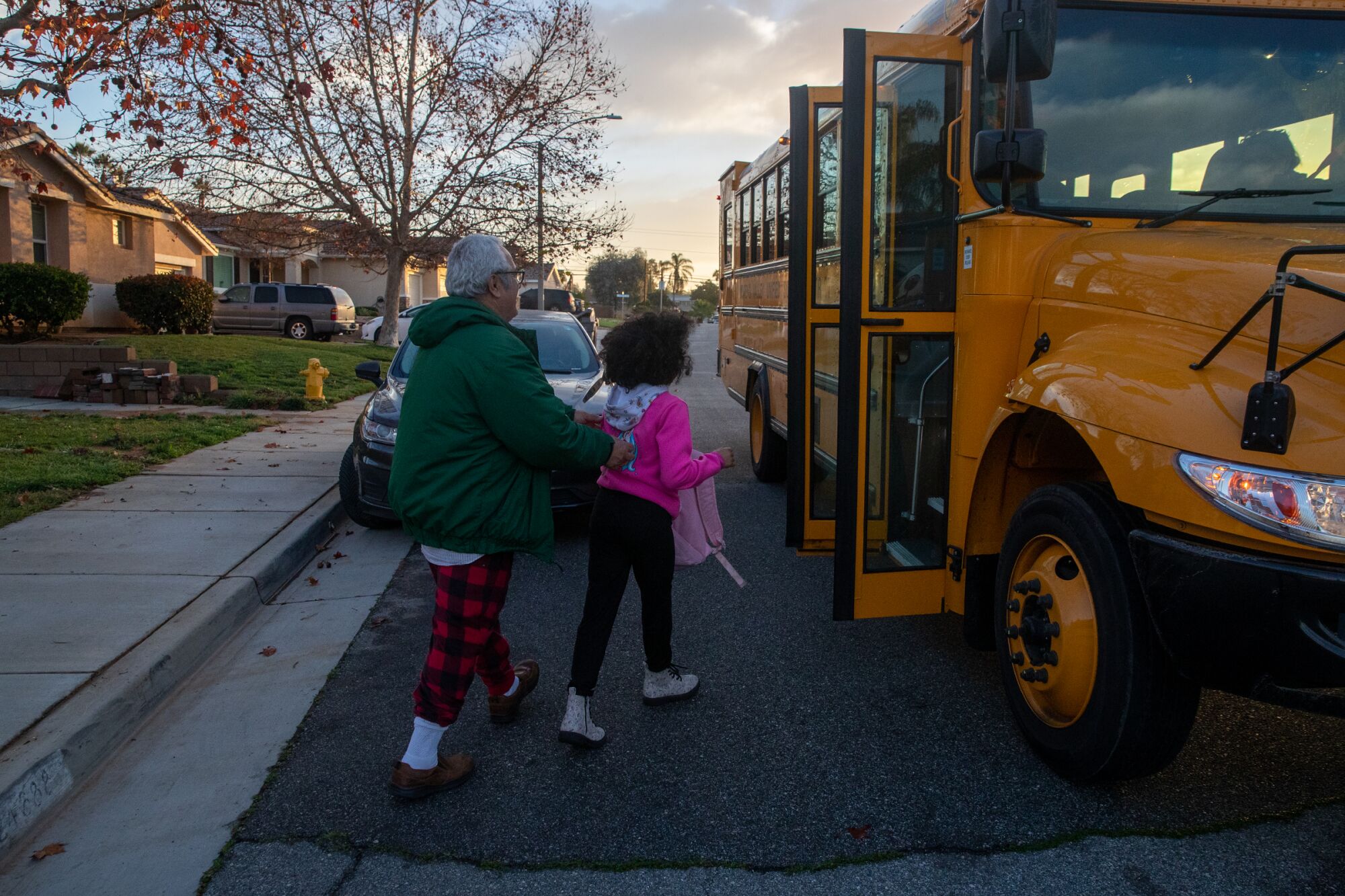
Teodulo Diarte helps 8-year-old Naomi onto the school bus in Riverside County.
(Irfan Khan / Los Angeles Times)
The teenager, with shoulder-length black hair and a ready smile, said she recalls better childhood memories with her grandparents than with her mom, “as hard as it is to say that.”
“Because that doesn’t mean that I don’t like my mom,” Melody continued. “I think something we can all agree on here, even though everything has happened, it doesn’t mean we don’t like my mom. I’m just disappointed in the things she’s done.”
By 8 a.m., when their three older girls had gone to school, Perez and Diarte sat down to breakfast with Harmony. As she spoke about her daughter, Perez began to cry at the dining room table. She didn’t know how Maria, who sang in the church choir and dreamed of becoming a graphic designer, had gotten to this point.
“I’m sorry,” Perez apologized to Harmony, as the little girl in the seat beside her listened to the “Baby Shark” song. She had promised the girls she wouldn’t cry for their mom anymore.
“It’s OK, Mom,” Harmony said, as she patted her grandmother’s arm. “It’s OK, Mommy.”
Perez sat at the table in tears. Then the phone rang. It was Maria.
Perez cried harder as her daughter reassured her that she was all right. Perez told her about a dream she’d had, where Maria lived in a big house and was safe.
“Y las niñas?” Maria asked, wondering about her daughters. “And the girls?”
Perez told Harmony to say hello. To tell her mom that she loved her. Harmony repeated the words.
The couple had held off on inviting Maria to their new home, worried she would lapse back into old habits. But Perez told her daughter about her worsening vision and asked her to stay with them.
“I need you,” Perez said.
They waited for her to come.
In her heart, Perez said, she felt Maria was ready to make a change.
“Just wait until she sees her girls,” the proud grandmother said, “how beautiful they are, how studious, the good job we’ve done with them.”
::
It was a mistake.
After Maria arrived, Naomi started acting out. She threatened her teacher. Her therapist said the girl was hearing voices. Soon after, Naomi was hospitalized for a week.
Esther’s grades dropped. Melody cried more often and started doing poorly in school.
On Jan. 31, Maria left. Perez had tried everything to get her to connect with the girls, even giving her money to take them to the mall to shop.
“None of it kept her here, not even her love for her daughters,” Perez said tearfully. “I thought the hour had come. It was my illusion as a mother.”
Perez sat her granddaughters down. She told them they’d done all they could. She promised them once more that she wasn’t going to cry for their mother.
After all, she has five other daughters to think about.
This story originally appeared on LA Times

